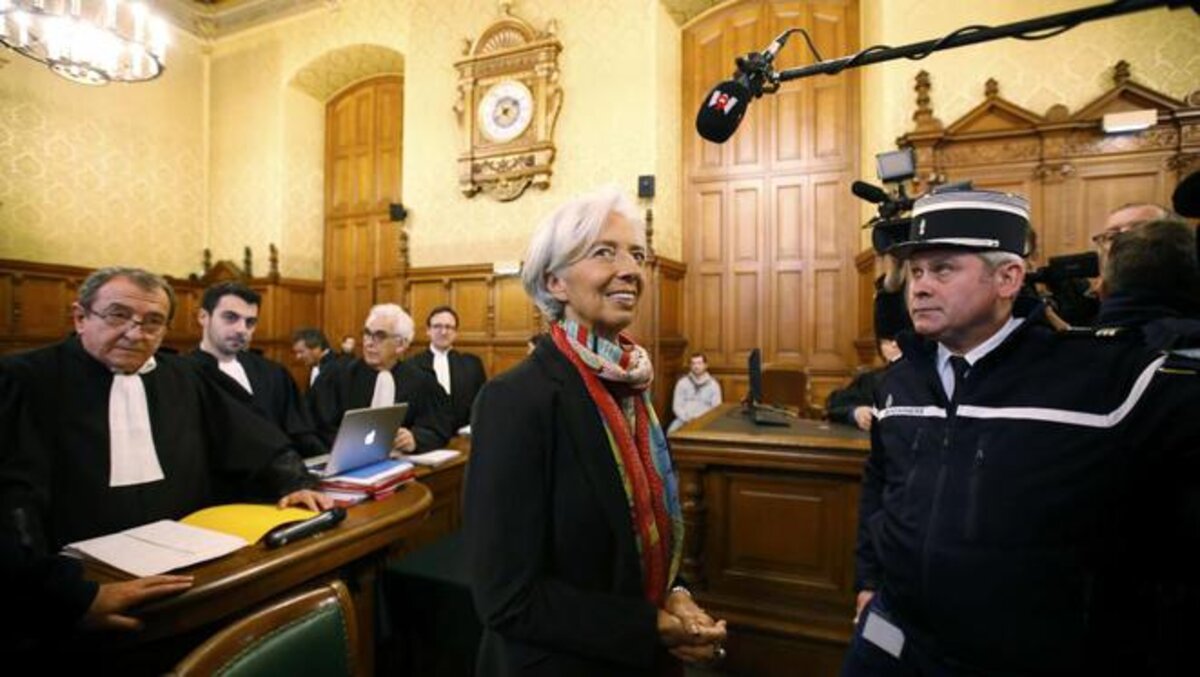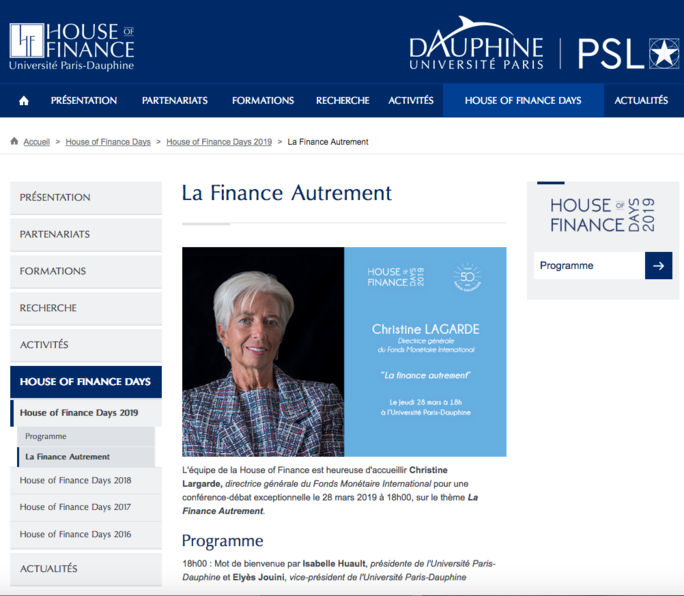In the trial that opened earlier this month of flamboyant French tycoon Bernard Tapie and five others accused variously of organising and of colluding in the fraudulent payout to him in 2008 of more than 400 million euros from state funds, a notable absentee on the witness stand is International Monetary Fund (IMF) chief Christine Lagarde.
Lagarde was French economy and finance minister at the time of the 404 million-euro compensation payout, which followed Tapie’s claim that he had been defrauded in 1993 by the then state-run bank Crédit Lyonnais in the sale of his assets in sportswear company Adidas, which he argued were deliberately undervalued by the bank.
Tapie, now aged 76 and suffering from stomach cancer, had sued the state for compensation in a legal battle fought out in the courts over 15 years, but a decision was taken, approved and overseen by Lagarde, to remove the case from the courts and to proceed with private arbitration.
The decision to enter into private arbitration, far more advantageous to Tapie than continuing with the case through the courts, was taken after Nicolas Sarkozy became president in 2007, and whose election campaign was leant support by Tapie, a high-profile public figure, a businessman and former socialist government minister whose maverick career included stints as a TV and cinema actor, a singer, and ownership of Olympique de Marseille football club.
Whether or not the private arbitration was ordered to thank Tapie for jumping political sides and supporting Sarkozy has never been clearly established, but what has is that the judging panel included arbitrators with close links to Tapie. After a lengthy investigation into the payout, a French civil court annulled the award and Tapie was ordered to pay back the sums he received after a final appeal was heard in 2017.
Meanwhile, in December 2016, a special French court, the Cour de justice de la République (CJR), which is dedicated to examining cases of wrongdoing by members of government in the exercise of their duties, found Christine Lagarde guilty of "negligence" in approving the arbitration and the award.
However, Lagarde, 63, who has denied wrongdoing, and who was appointed managing director of the IMF in 2011, escaped punishment.

Enlargement : Illustration 1

In the criminal trial this month, which opened on March 11th and is due to last until April 5th, Tapie’s co-defendants include Stéphane Richard, now chairman and CEO of French telecoms group Orange, who was Lagarde’s chief of staff at the economy and finance ministry, and who is accused of aiding and abetting the fraudulent arbitration process. The four others are one of the private arbitration judges, Pierre Estoup, Tapie’s lawyer Maurice Lantourne, and two former senior civil servants, Jean-François Rocchi and Bernard Semema, who were members of the public bodies which agreed the deal with Tapie.
The charges against the six, ranging from committing to abetting fraud and misappropriation of public funds, carry maximum sentences of ten years in jail, and fines of up to a million euros.
Richard denies wrongdoing, but Lagarde, who has claimed she approved the arbitration process to draw to an end a costly and long-running dispute, said during her trial before the CJR that she had “relied” on Richard’s advice, as he was tasked with studying the voluminous documents relating to the affair, beginning before she took office.
Called as a witness to this month’s trial by Tapie’s defence team, Lagarde has decided not to appear. Her decision, announced by the presiding judge who gave no motive for her absence, was surprising, given her previous denials of wrongdoing and the opportunity presented by the trial to reassert her honour. She would have been able to clarify her position with regard to her former chief of staff Stéphane Richard, against whom she has apportioned blame, as well as to also respond to questions by lawyers representing the state, a civil party to the case.
Her absence is also surprising given that, under French law (article 109 of the French penal code) any person who is called as a witness at a trial must “appear, place themselves under oath and testify”, and should they refuse they face prosecution (article 438 of the penal code).
Furthermore, in their preparations for the trial, the magistrates have shown themselves to be particularly understanding of the constraints of witnesses, organising the hearings at dates which allow them to appear; Pierre Mazaud, one of the three judges of the private arbitration process will appear on Tuesday March 26th, while all the other witnesses are called to testify on March 27th and 28th.
With no reason given for the absence of such a key witness, one might suppose that the only explanation is the busy agenda of the IMF chief based in Washington and who, at the summit of international financial affairs, spends a large part of her time travelling the globe.

Enlargement : Illustration 2

But Mediapart has now discovered that there is no such obstruction to her attending the trial to provide her important testimony. For on March 28th, a day when many witnesses will appear, Lagarde will in fact be visiting the French capital, when she has found the time to appear at a small colloquium of relatively little importance at the Paris-Dauphine university, situated just a few kilometres away from the Palais de justice law courts where the trial is being held. Lagarde is a guest speaker at the event (see programme, left), centred on a debate before university students entitled “La finance autrement” and chaired by Nicolas Beytout, founder and director of French daily L’Opinion.
The choice of Lagarde as guest speaker at the debate, which is likely to be less of a challenge to her than the exchanges she might expect were she in court, is an audacious one, given the former minister contributed, if only by what the CJR found was her “negligence”, to the fraudulent award to Bernard Tapie of 404 million euros.
Below is a video interview, subtitled in English, with Lagarde by Mediapart’s Laurent Mauduit in May 2011, during a press conference announcing her candidature for the post of IMF managing director, in which she dismissed what were already very serious allegations over the Tapie arbitration award, when she insisted she had “always worked in the strict interest of the state and in total respect of the law”.
-------------------------
- The French version of this article can be found here.
English version, with added reporting, by Graham Tearse


